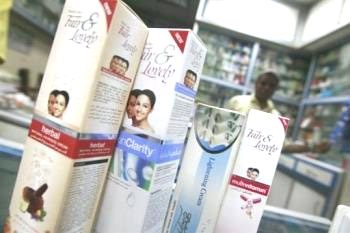AFP
Aug 20, 2008
A whiter shade of pale: skin-lightening in the Arab world
AFP
Aug 20, 2008
CAIRO, Aug 20, 2008 (AFP) - Marwa wants a paler face and is willing to try a whole range of lightening creams that promise beauty, love and success to Arab women. But such products have also been slammed as "racism in a bottle".
 An Egyptian pharmacist shows some of the whitening creams on sale at his drug store - Photo : AFP |
The 19-year-old Egyptian works for a hairdresser in the poor Cairo district of Bulaq al-Dakrur, and is spoilt for choice as cheap blends share shelf space with brand-name products that have now found a niche in the Arab world.
Skin-whitening using home-made or store-bought products has long been a tradition in Asia and Africa, but has taken off commercially in the Middle East with Dutch-British company Unilever leading the market with its "Fair and Lovely" brand.
As women in the West compete for a year-round copper glow and pages in lifestyle magazines are devoted to self-tanning lotions, in the Arab world beauty is defined by the paleness of a woman's skin.
And while beaches may be teeming during the summer months, many women go to great lengths to shade themselves from the sun, particularly in the villages of Egypt, Morocco, Syria and Tunisia.
For example, they cover their bodies up for weeks on end before a wedding, striving for what is deemed to be an ideal alabaster skin-tone.
"What is rare is expensive," according to Hassan Ahmed, a professor of sociology at Cairo's Ain Shams University.
"Since in Egypt, like in the rest of the Arab world, olive skin is the most common, we prefer white skin," he told AFP.
"White skin is the dream of all women, especially in the Gulf," added a blonde television presenter of a shopping programme on the Saudi-owned satellite channel MBC4, describing how people "suffer" from olive skin.
The Middle East and North Africa market was a godsend for Unilever which recognised the enormous potential in those countries mainly because of a growing young population.
The group told AFP that sales of Fair and Lovely have risen by 15 percent a year in the region since 2005, with a peak of 18 percent in 2007.
Television adverts for the cream deliver a simple message -- that whiter skin is the key to a more successful life.
-- Racism in a bottle --
------------------------
Each ad has a similar theme: whether she wants to be a dancer or a doctor, a young woman's olive skin is an obstacle. But after using the cream she clinches her dream job, earns the recognition of her peers or gains the attention of the man she wants.
But despite the popularity of some of these creams, the ads have been criticised as racist.
Two groups on the social networking Internet site Facebook condemn the brand, one using humour: "Fair and Lovely Cream is racist but I still use it." The other is more harsh: "Ban Fair and Lovely, racism in a bottle."
Habiba Hamid, who created one of the Facebook groups, told AFP that whitening creams "exacerbate and capitalise on the kind of racism which privileges lighter skin over darker."
"If the products themselves aren't banned, any form of advertising for them should be. They are clearly racist adverts."
But Unilever defends itself against such accusations, saying that the product responds to a market need.
"The desire to change/modify skin tone is universal. Depending on the notion of beauty prevalent in a particular society, this may be manifested either as lightening or darkening the existing skin tone. This desire cuts across cultures, income levels, educational levels and gender," Unilever told AFP by email.
"Given the above there is nothing to suggest that the marketing of Fair and Lovely or its position of skin lightening is therefore imperialist, racist or exploitative," the group said.
The attraction of white skin in the Middle East cuts across class lines.
Salwa, from a wealthy family and educated, well-travelled and sharing many Western values, was told by her boyfriend: "I love you despite the fact that you have olive skin."
Lightening creams are available in many forms, from unregulated brandless bottles to prescription creams aimed at treating acne scars and removing blemishes.
Dermatologist Rihab Sobhi says she has had to treat damage caused by the use of non-prescription skin products including lightening creams.
Patients come to her requiring treatment for everything from marks and scars on their skin to allergies caused by the creams or even burns.
Some whitening creams contain bleaching agents that are dangerous if used at high levels or too often, said Magda Abdel Samie, a Cairo beautician. "If used incorrectly the creams can cause skin conditions that take a very long time to treat."
"Some of these creams are very cheap. They are found everywhere and are very easy to buy," Sobhi told AFP. "The problem is young girls want to use them all the time, which is very dangerous."by Ines Bel Aiba
Copyright © 2024 AFP. All rights reserved. All information displayed in this section (dispatches, photographs, logos) are protected by intellectual property rights owned by Agence France-Presse. As a consequence you may not copy, reproduce, modify, transmit, publish, display or in any way commercially exploit any of the contents of this section without the prior written consent of Agence France-Presses.

























